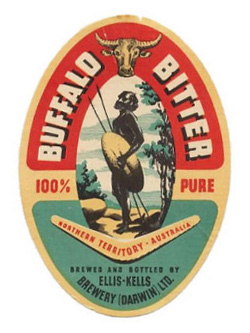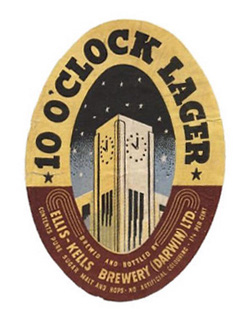
The Ellis-Kells Brewery, Darwin
The name of Harry Ellis-Kells is usually associated in Australia’s brewing history with failure, if anything. It would only be fair, however, to give him some credit for daring, and for persistence in the face of adversity.
 Ellis-Kells arrived in Darwin at the end of April 1950 to begin the task of building a brewery in the war-ravaged tropical town of about seven thousand people. Despite war-caused shortages of many of the things required to build and operate a brewery, and many other obstacles, he succeeded in producing beer on a commercial scale for probably the first time ever in Darwin, and probably for the first time in the Northern Territory since a small brewery operated at Alice Springs in the 1890s.
Ellis-Kells arrived in Darwin at the end of April 1950 to begin the task of building a brewery in the war-ravaged tropical town of about seven thousand people. Despite war-caused shortages of many of the things required to build and operate a brewery, and many other obstacles, he succeeded in producing beer on a commercial scale for probably the first time ever in Darwin, and probably for the first time in the Northern Territory since a small brewery operated at Alice Springs in the 1890s.
Ellis-Kells obtained a 99-year lease over a block of land in Darwin’s newly-created Heavy Industry Area. Sixteen blocks in the area had been auctioned in April 1950, but only two were sold. Ellis-Kells was one of several parties who took up blocks soon after the auction. He very quickly commenced the construction of his brewery building, and in December was able to advertise that positions would be open for eleven men, seven women and six juniors early in the new year.
The details of the positions reveal something of the intended operation of the brewery. The positions for males comprised one for making cases, two for packing cases, one truck driver, one yardman, three bottling machine operators, two floormen, and one cooper. Positions for females would be one stenographer (‘fully qualified’, or course), two bottling machine operators, two bench attendants, and two general hands. Applicants for the junior positions, three male and three female, were requested to state if they were willing to become apprenticed to various trades in the brewery.
Ellis-Kells was the managing director of Ellis-Kells Brewery (Darwin) Limited, the company formed to operate the brewery. He came to Darwin claiming to have had ‘years of experience’ in the brewing business, but details of this experience are not known. It was his intention to make a product that would serve the double purpose of providing continuity of supplies, and reducing considerably the cost of beer drinking in the Territory. Four different beers were proposed: Buffalo Bitter, Palmerston Dinner Ale, Darwin Ale and Darwin Lager.
Although obtaining land on which to build the brewery was a simple matter, from that point Ellis-Kells was faced with almost insurmountable obstacles. He was provided with a water supply 100 yards from his block, requiring piping to be laid through land leased to another party and across a public road; he was refused permission to operate an electric motor from Darwin’s electricity supply even for a few hours daily; and, as might be expected, the established southern brewers with whom he would soon be competing declined to sell him essential brewing ingredients, forcing him to purchase these from abroad.
The first brew of Darwin beer was laid down early in February 1951, after which all the licensed premises in the Territory were advised that the beer would be on sale from March. Production was to be at the rate of 7,000 gallons (about 32,000 litres) per week initially, increasing to 14,000 gallons over the next six months. The latter figure was roughly equivalent to the total consumption of beer in the Territory, all of which was brought at great expense from interstate.
 Early problems with the brewery’s beer filtration system delayed the attainment of ‘full production’. Ellis-Kells was not satisfied with the clarity of his first several brews, so placed an order on a Sydney firm of engineers for a new filter. Its manufacture was greatly delayed, which was typical for the time, and it had not been delivered in the middle of May.
Early problems with the brewery’s beer filtration system delayed the attainment of ‘full production’. Ellis-Kells was not satisfied with the clarity of his first several brews, so placed an order on a Sydney firm of engineers for a new filter. Its manufacture was greatly delayed, which was typical for the time, and it had not been delivered in the middle of May.
Ellis-Kells spent about a month in the southern capitals in April and May 1951 in his endeavour to obtain materials for the brewery. He arranged with an Adelaide firm to supply 200 wooden kegs, and with another for 10 and 18-gallon steel containers. A Sydney firm would make fifty wooden 54-gallon hogsheads.
Some time in the couple of months after Harry’s return to Darwin in mid-May 1951, things went seriously wrong with his brewery business. A judgement was obtained against him in a Darwin court in late July by a contractor whom he owed money, and the contractor subsequently obtained a writ to enable him to obtain possession of goods from Ellis-Kells to the value of the debt.
In mid-August, Harry loaded a quantity of furniture and beer into his truck, and left Darwin with that vehicle and his 1934-model Packard car and his caravan and went to Queensland. The beer was seized by customs officers at Mount Isa. The truck and furniture were seized at Cloncurry, and the car and caravan at Townsville, and placed in the hands of a Queensland Supreme Court bailiff. When a bankruptcy notice was issued against William Henry Colin Ellis-Kells in November 1951, his whereabouts were unknown.
Rumours circulating in Darwin about the fate of the Ellis-Kells Brewery after Harry’s disappearance were checked in February 1952 by the publication by a Darwin auctioneer of an advertisement offering the remaining 97½ years leasehold, the buildings, the equipment, and the stock for sale. The whole property was purchased by the brothers Bernard and John Allen, Darwin motor engineers, who announced in May that they planned to upgrade the brewery and bring it back into production. A prospectus was published in September 1952 for a company to be called Darwin Brewing Limited, which would purchase the former Ellis-Kells property from the Allen brothers. Although there was reportedly ‘widespread interest’ in the plan, insufficient capital was subscribed and the proposal lapsed early in 1953.
Although Ellis-Kells was frequently in the news from 1950, when he began to build his brewery, until 1952, when he was being chased around Queensland, nothing is known about him before or after that period. His other great feats, therefore, besides starting the Ellis-Kells Brewery, were to appear from, and to vanish to, nowhere. If any reader has further knowledge of the man, the writer would be very pleased to hear of it.



